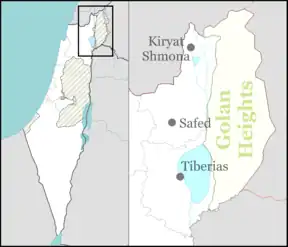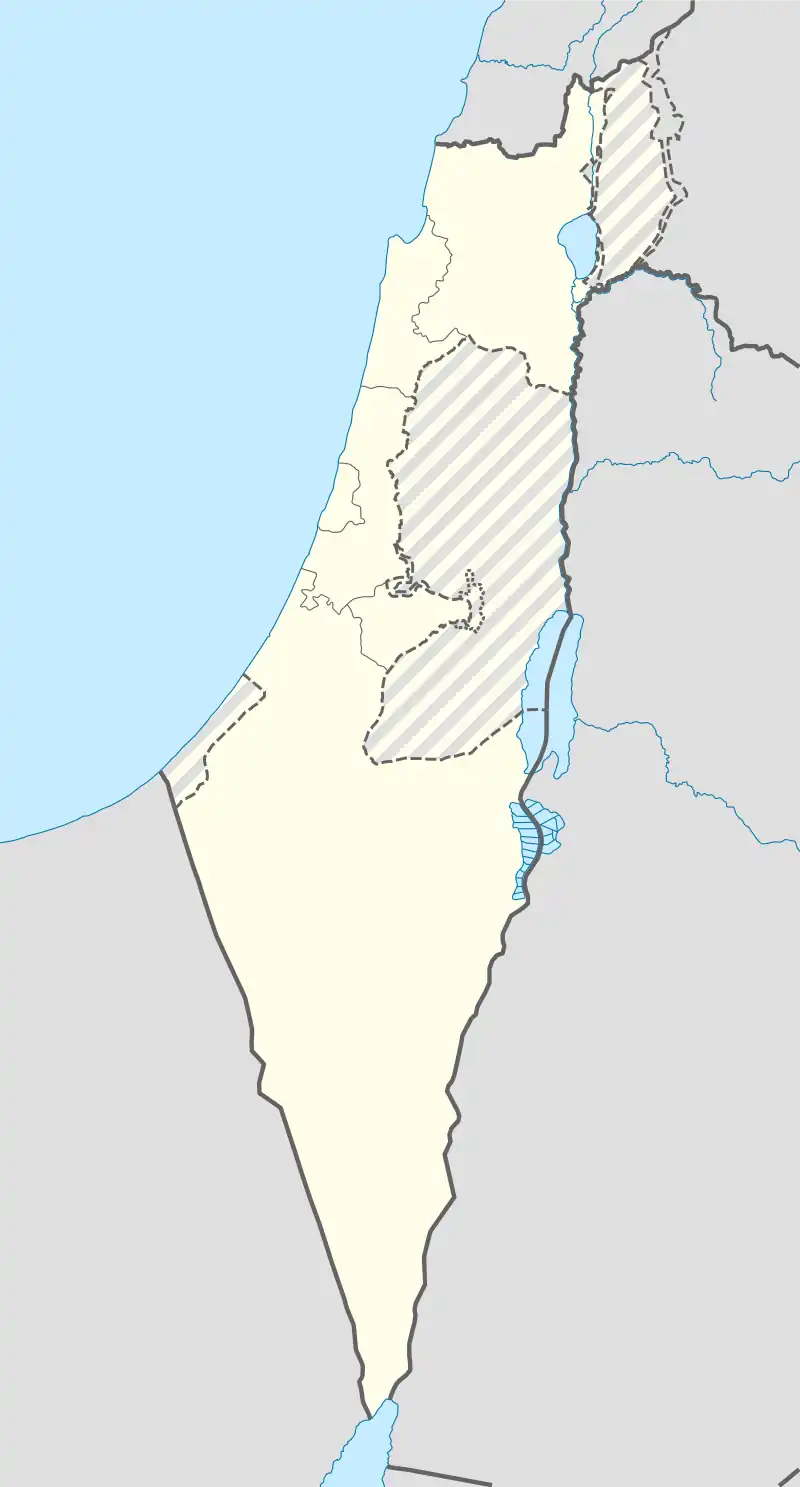Sha'ar HaGolan
שַׁעַר הַגּוֹלָן | |
|---|---|
 | |
| Etymology: Gate of the Golan | |
 Sha'ar HaGolan  Sha'ar HaGolan | |
| Coordinates: 32°41′11″N 35°36′12″E / 32.68639°N 35.60333°E | |
| Country | |
| District | Northern |
| Council | Emek HaYarden |
| Affiliation | Kibbutz Movement |
| Founded | 21 March 1937 |
| Founded by | Czechoslovak and Polish Hashomer Hatzair members |
| Population (2021)[1] | 526 |
| Website | www |
Sha'ar HaGolan (Hebrew: שַׁעַר הַגּוֹלָן, lit. Gate of the Golan) is a kibbutz situated at the foot of the Golan Heights in the Jordan Valley area of north-eastern Israel. Located less than 1 km from the border with Jordan, it falls under the jurisdiction of Emek HaYarden Regional Council. In 2021 it had a population of 526.[1]
History
Sha'ar HaGolan was founded on 21 March 1937 by members of the Hashomer Hatzair youth movement from Czechoslovakia and Poland. The founders met and were organized as a team in 1930 in Rishon LeZion and were called "Ein Hakore" until 1937, when they established the kibbutz as a tower and stockade settlement.
During the Battles of the Kinarot Valley in the 1948 Arab–Israeli War, the defenders of Sha'ar HaGolan and of neighbouring kibbutz Masada, after withstanding a first Syrian attack and further aerial bombardment and shelling, retreated due to lack of reinforcement and direction. The kibbutzim were captured and briefly held by the Syrian Army, during which time they were looted and burned down. Although the members soon returned, a stigma was attached to them, and vindication in the form of released military records only arrived in recent years.[2]
Economy
The main source of income is a plastics engineering factory. The kibbutz also grows bananas, avocado and watermelons, and has a herd of dairy cows. Another economic sector is tourism, one of the attractions is a museum of Yarmukian culture exhibiting pre-historic Neolithic findings discovered along the banks of the Yarmuk River.[3] Established in the 1950s, it was Israel's first museum of prehistory.[4]
Archaeology
Excavations at Sha'ar HaGolan archaeological site unearthed an 8,000-year-old village and artifacts that include the first pottery cooking pots found in the Land of Israel. This Neolithic Yarmukian village was inhabited by the people who abandoned their nomadic lifestyle in favor of permanent settlement, marking the shift from hunting and gathering to agriculture.[4]
In July 2022, archaeologists from the Israel Antiquities Authority (IAA) announced the discovery of an 8,000-years-old "Mother goddess" figurine at Sha'ar HaGolan archaeological site. Anna Eirikh-Rose, co-director of the excavation reported that the 20-centimeter long figurine covered by a bracelet with a red bottom was found broken into 2 pieces. It was sculpted in a sitting position with big hips, a unique pointed hat and what is known as 'coffee-bean' eyes and a big nose.[5][6]
Galleries
- Sha'ar HaGolan 1937
-JNF009776.jpeg.webp) Sha’ar HaGolan from Kibbutz Masada 1937
Sha’ar HaGolan from Kibbutz Masada 1937_-_%D7%9E%D7%A8%D7%90%D7%94_%D7%9B%D7%9C%D7%9C%D7%99-JNF009512.jpeg.webp) Sha’ar HaGolan 1937
Sha’ar HaGolan 1937 Sha'ar HaGolan 1937
Sha'ar HaGolan 1937 The watchtower being erected at Sha'ar HaGolan, 21 August 1937
The watchtower being erected at Sha'ar HaGolan, 21 August 1937
- Kibbutz Sha'ar HaGolan 2010
 Guesthouse
Guesthouse Canteen
Canteen Kindergarten
Kindergarten Postboxes
Postboxes Chorisia Insignis
Chorisia Insignis Aloe
Aloe Artwork
Artwork Sabbath celebration
Sabbath celebration
Notable people
References
- 1 2 "Regional Statistics". Israel Central Bureau of Statistics. Retrieved 22 February 2023.
- ↑ Nadav G. Molchadsky (2015), "Living in the Shadow of Shame: Masada and Sha’ar ha-Golan," in History in the Public Courtroom: Commissions of Inquiry and Struggles over the History and Memory of Israeli Traumas (Ph.D. Dissertation, University of California, Los Angeles), pp. 76-118. Also see Zionist mythology destroys its children Haaretz, 6 April 2006
- ↑ Archaeological Excavations at Sha`ar Hagolan - A Neolithic Art Center in the Jordan Valley, Israel Hebrew University of Jerusalem
- 1 2 Vered, Ronit. "For All Tastes". Haaretz.
- ↑ "8,000-year-old Yarmukian 'Mother Goddess' figurine uncovered in Israel". The Jerusalem Post | JPost.com. Retrieved 2022-07-31.
- ↑ kayra, oguz (2022-07-08). "8,000-year-old Yarmukian 'Mother Goddess' figurine discovered in Israel". Arkeonews. Retrieved 2022-07-31.